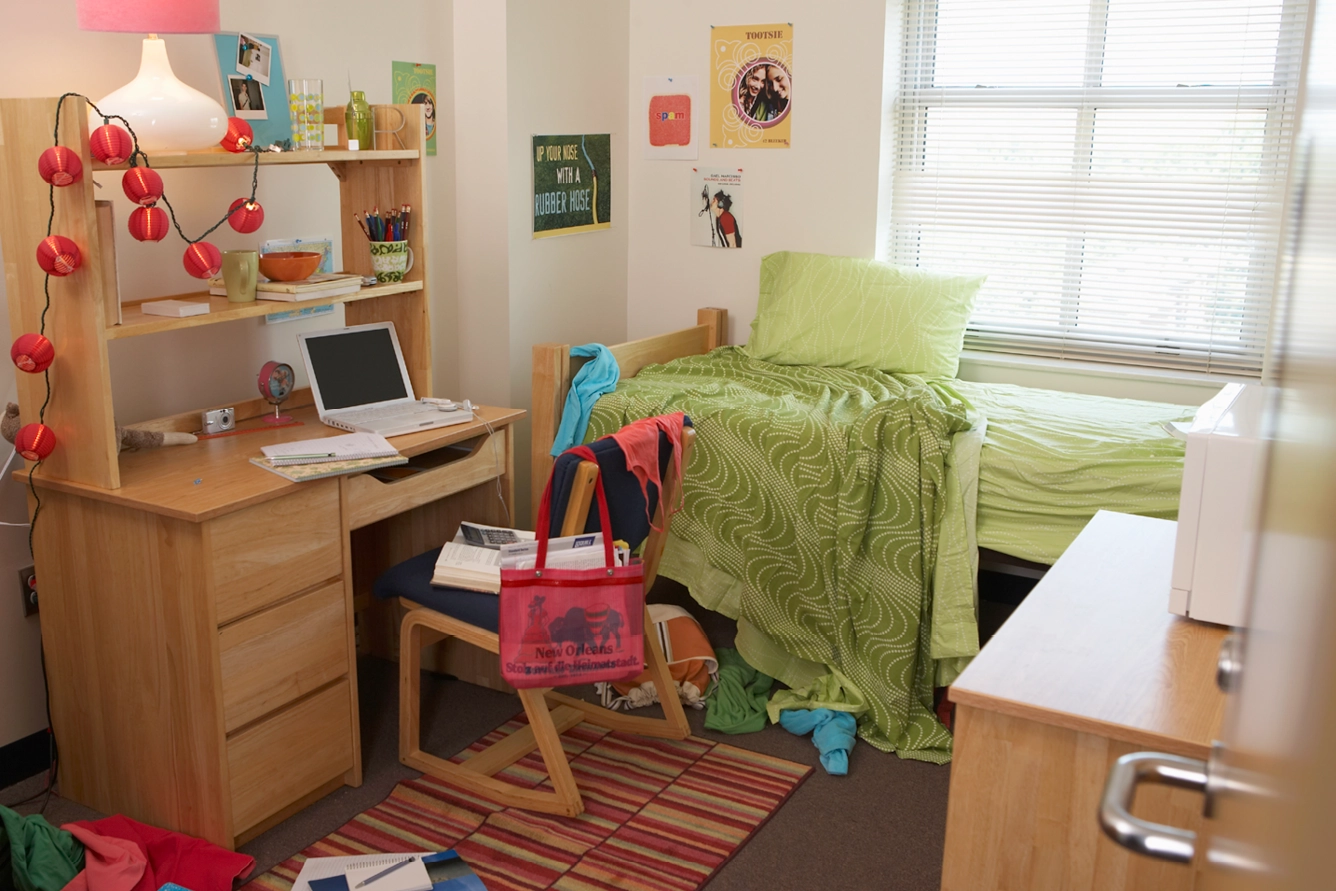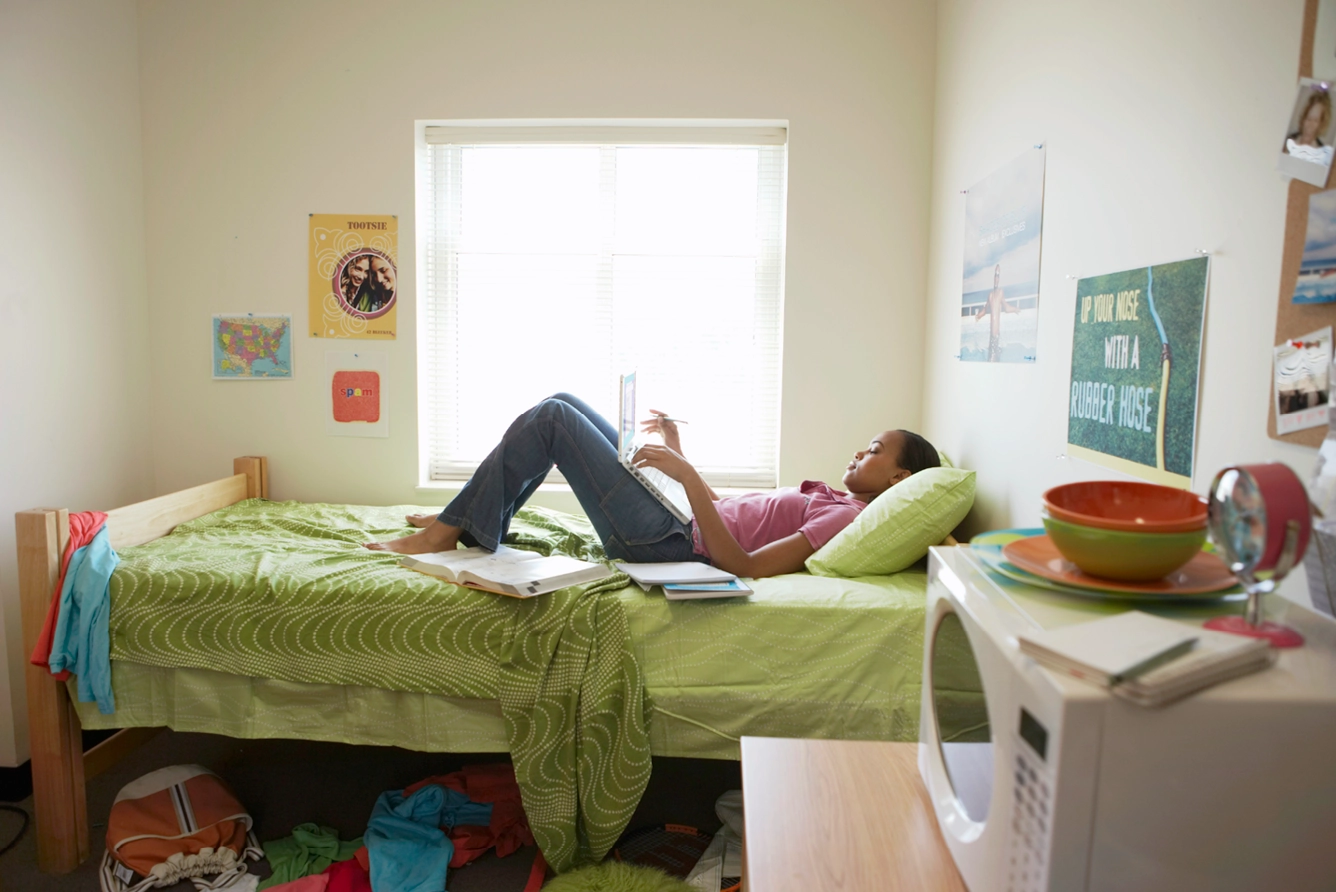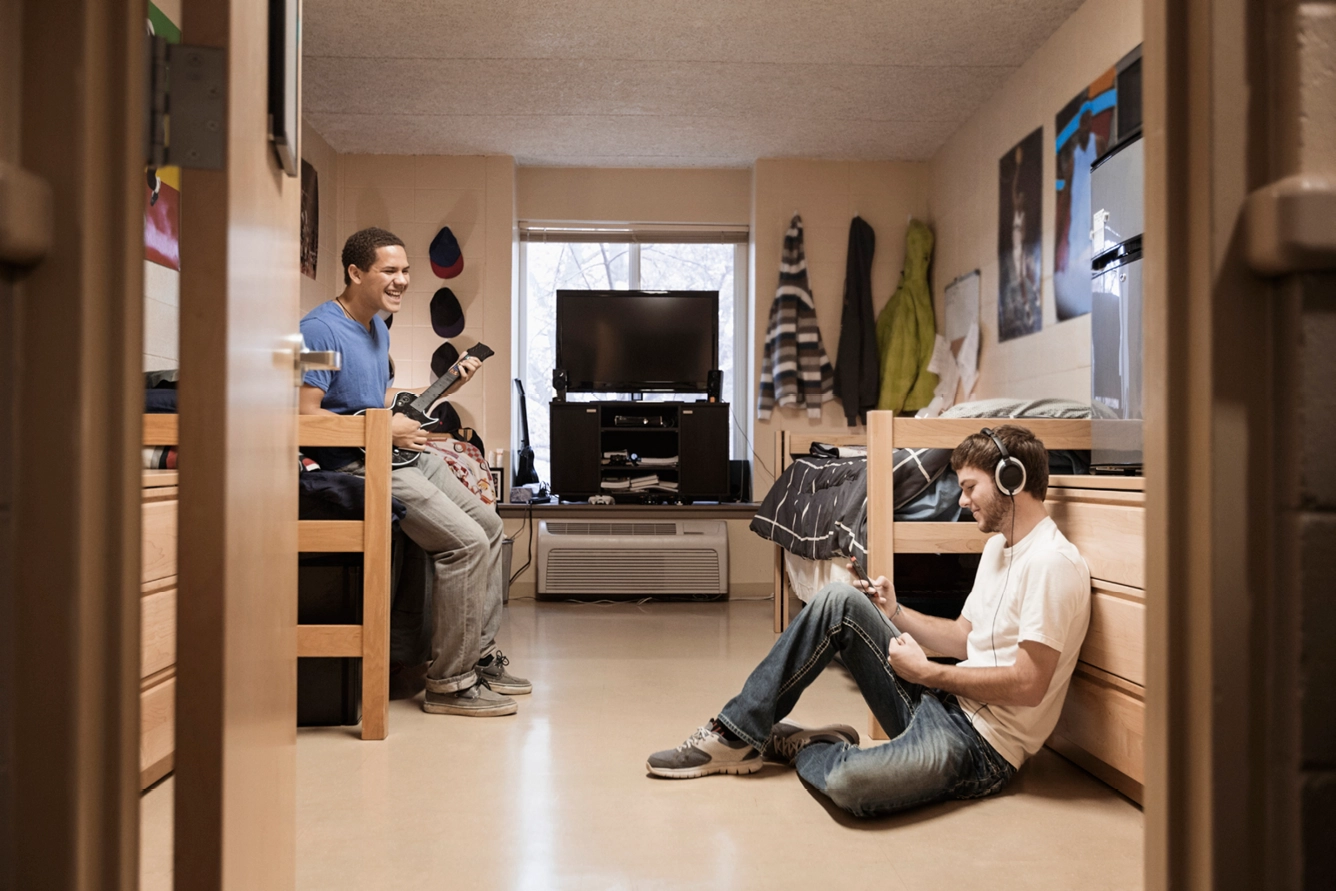Starting college or university is a significant milestone. It’s a period filled with new experiences, newfound freedoms, and the challenges of living independently. For many students, this may be their first time living away from home. Amidst the excitement of setting up a new dorm room or apartment, one essential detail often goes overlooked: tenant insurance.
Consider this: You’ve just settled into your new apartment, and everything seems perfect. However, a pipe bursts during winter break, flooding your room and damaging your prized laptop, textbooks, and other belongings. Without tenant insurance, the cost to replace these items could set you back significantly.
Moreover, it’s about more than protecting your belongings. Imagine accidentally causing a small kitchen fire while trying out a new recipe. Without insurance, you might be on the hook for the repair costs. Tenant insurance offers protection against these unexpected events, ensuring that one mistake or mishap doesn’t lead to financial strain.
Yet, despite its importance, many post-secondary students either need to learn about tenant insurance or mistakenly believe they don’t need it. This article aims to shed light on the significance of tenant insurance for post-secondary students, unravelling its components and highlighting why it’s an essential investment for peace of mind during your academic journey.
What is Tenant insurance?

Tenant insurance, sometimes called renters insurance, is a policy designed specifically for individuals who rent their living space, whether a dormitory, an apartment, or a shared house. Unlike the insurance your landlord might have, which typically covers the building itself and common areas, tenant insurance is about protecting you – the renter.
Components of Tenant Insurance
Protection for Personal Belongings
Just think about the value of everything you own. From that brand-new laptop you use for your studies, the smartphone you can’t live without, to your wardrobe and kitchen gadgets. If any of these items were stolen, damaged by fire, or ruined by a water leak, tenant insurance could help cover the replacement costs.
Liability Coverage
Accidents happen, especially in unfamiliar environments or new living situations. If you unintentionally cause damage to your rented property or if someone gets injured while in your apartment, liability coverage can help protect you from the potentially steep costs associated with legal fees or medical bills.
Additional Living Expenses
If an unforeseen event, like a significant water leak or fire, renders your rented space uninhabitable, this coverage can help pay for temporary accommodations, such as a hotel, and other related expenses until you can safely return.
Tenant Insurance vs. Homeowner Insurance
While tenant and homeowner insurance protects personal belongings and liability, the key difference lies in the structure coverage. Homeowner insurance covers the actual building – from damages due to fires, storms, or other covered perils. As a renter, you don’t need to insure the building; that’s your landlord’s responsibility. Your primary concern is everything you’ve filled your living space with and any potential liabilities. While the landlord’s insurance concerns the bricks, mortar, and shared rooms, tenant insurance concerns you and your belongings inside those four walls.
Why Do Post-Secondary Students Need Tenant Insurance?

The buzz of college or university life and the challenges and rewards of newfound independence can be all-consuming. Amidst class schedules, social events, and managing personal expenses, insurance might be the furthest thing from a student’s mind. But herein lies the danger. A single unfortunate event’s effects can be emotionally and financially devastating without proper coverage.
Addressing Common Misconceptions
“My Landlord’s Insurance Will Cover My Belongings”
This is a prevalent misconception. A landlord’s policy is primarily designed to protect the physical structure of the building and some basic furnishings they might provide. Your personal belongings — from your laptop to your collection of sneakers — are not covered under their policy.
The Real Risks Students Face
Theft
Campus areas and student housing are often prime targets for theft. With various people coming and going and the occasional open door or window, the opportunities for theft are higher. The loss can be heart-wrenching, whether it’s an expensive piece of tech or a cherished keepsake.
Accidental Damage
Late-night study sessions or gatherings can lead to accidental damage. Spilled liquids on electronics, broken furniture, or even a cooking mishap that causes smoke damage are all potential risks.
Fire and Other Disasters
Though rare, incidents like fires can happen, especially in shared living environments where you can’t control what others do. A small kitchen fire or an unattended candle can lead to significant losses.
Water Damage
The damages can be substantial and expensive, whether from a broken pipe, overflowing sink, or another tenant mishap that sends water into your apartment.
The Value of a Student’s Belongings
It’s easy to underestimate the cumulative value of one’s possessions. Those textbooks cost a pretty penny, and so does that gaming console you use to unwind. Then there’s the wardrobe, the musical instrument you play, the specialty kitchen gadgets you’ve accumulated, and the list goes on. In the event of loss, replacing these items out-of-pocket can be a staggering expense, especially on a student budget.
Protection Beyond Property
Beyond protecting your belongings, tenant insurance serves as a safety net for other unexpected events. You could be held responsible if someone injures themselves in your rented space. The legal and medical costs could be overwhelming without the liability coverage from your tenant insurance.
Tenant insurance for post-secondary students is not just a good-to-have; it’s essential. As the saying goes, “It’s better to have it and not need it than to need it and not have it.” Investing in a policy now provides protection and peace of mind, allowing students to focus on what truly matters – their academic and personal growth during these formative years.
Coverage Components of Tenant Insurance

Personal Property Protection
This is the core of tenant insurance and is designed to safeguard your belongings against various perils.
Replacement Cost vs. Actual Cash Value
There are two primary ways your belongings can be valued in a policy.
- Replacement Cost: If your belongings are lost or damaged, you will receive the amount it costs to purchase new items of the same kind and quality without accounting for depreciation.
- Actual Cash Value: This approach factors in depreciation. You would receive what your items are currently worth, which could be less than what you initially paid.
Special Limits for Specific Items
While your policy might cover personal property in general, there might be limits on specific high-value items, like jewelry, art, or certain electronics. If you have items of significant value, additional coverage or endorsements are worth considering.
Liability Coverage
Liability can sound daunting, but it protects you financially if you’re found responsible for unintentionally harming others or their property.
Protection Against Accidental Damage
Suppose you accidentally cause damage to the rental property, like a broken window or a stained carpet. In that case, this coverage can help with repair costs.
Coverage for Injuries
Should a visitor slip and fall or sustain any injury in your rented space, liability coverage can help cover medical bills or legal fees if they decide to sue.
Additional Living Expenses
Sometimes, your rental space might become temporarily uninhabitable due to an unforeseen event. This part of your policy can be a lifesaver.
Coverage for Temporary Relocation
If, for instance, there’s a fire in your building and repairs mean you need to leave for a while, this coverage helps with the costs of living elsewhere, like hotel bills or additional meal expenses.
Coverage Duration
Knowing how long your policy will cover these additional living expenses is essential. Some might provide for a few weeks, while others could extend longer, depending on the severity of the situation.
Tenant insurance is more than just protection for your belongings. It’s a comprehensive shield against unexpected events that could otherwise wrench your academic journey. When selecting a policy, consider the total value of your possessions, potential liability situations, and the possibility of needing temporary accommodation. An ideal policy will offer a balance of coverage in all these areas, tailored to your needs and budget.
Factors That Influence the Cost of Tenant Insurance

Cost is a significant consideration, especially for post-secondary students who often juggle tuition fees, living expenses, and other financial obligations. It’s essential to understand the various elements that determine the premium of a tenant insurance policy. This knowledge helps in budgeting and finding opportunities to reduce costs potentially.
Location of the Rental Property
- Safety & Crime Rates: Apartments in safer neighbourhoods or low-crime areas may have lower insurance premiums.
- Proximity to Fire Stations: Being closer to emergency services could reduce the insurance cost.
- Historical Data: Areas with fewer claims or historically less severe incidents might have more favourable rates.
Security Features in the Property
- Alarms: Having a burglar alarm, especially one that’s monitored, can sometimes earn you a discount.
- Locks: Quality deadbolts and secure windows can play a role in reducing the chance of theft.
- Fire Safety: Smoke detectors, sprinkler systems, and fire extinguishers can positively impact your insurance rate.
Deductible Choice
The deductible is the amount you’d pay out-of-pocket before your insurance kicks in. A higher deductible usually means a lower premium, but ensuring that the deductible is an amount you’re comfortable covering if an incident occurs is vital.
Value and Type of Personal Belongings
- Total Value: The more valuable your possessions, the more it might cost to insure them.
- Special Items: If you have unique or high-value items like jewelry, specialized electronics, or collectibles, this might influence the premium, especially if you opt for additional coverage.
History of Claims
While this might not apply to many first-time insurance buyers, having a history of frequent insurance claims could lead to higher premiums.
Coverage Limits and Add-Ons
- Coverage Limits: The higher the coverage limit you choose for your personal property or liability, the higher your premium might be.
- Optional Coverages: Additional protections or endorsements can impact costs. For instance, adding coverage for sewer backups or specific high-value items can affect the price.
Discount Opportunities
- Bundling: If you purchase multiple types of insurance (like auto and tenant insurance) from the same provider, you might qualify for a discount.
- Student Discounts: Some providers offer discounts specifically for post-secondary students or those in specific educational programs.
While the price is an essential factor, it shouldn’t be the only one. Balancing cost with the breadth and depth of coverage is crucial, ensuring you’re adequately protected against potential risks. By understanding these influencing factors, students can make informed choices, securing comprehensive protection without breaking the bank.
Common Myths and Misconceptions about Tenant Insurance for Students

Navigating the insurance world can be daunting, especially when bombarded with facts and fiction. Let’s debunk some common myths and misconceptions post-secondary students might have about tenant insurance.
“My Landlord’s Insurance Covers My Belongings”
Truth: As mentioned earlier, a landlord’s insurance typically covers the building structure and any fixtures or fittings owned by the landlord. Your personal belongings and liability are not protected under their policy.
“Tenant Insurance is Too Expensive for Students”
Truth: Many students overestimate the cost of tenant insurance. In reality, the premiums are often quite affordable, especially considering the potential out-of-pocket costs of replacing belongings after an unforeseen event.
“I Don’t Have Enough Stuff to Insure”
Truth: It’s easy to underestimate the cumulative value of personal possessions. From electronics and textbooks to clothing and kitchenware, the cost of replacing these items can add up quickly.
“I’m Covered Under My Parents’ Home Insurance”
Truth: While some home insurance policies might offer limited coverage for students living away from home, it’s essential to check the specifics. Often, the protection might not be comprehensive, and there could be caps on the coverage amount.
“Tenant Insurance Only Covers Theft”
Truth: A standard tenant insurance policy covers a variety of perils, not just theft. This includes fire, certain types of water damage, vandalism, and more.
“If I Share an Apartment, My Roommate’s Policy Covers Me”
Truth: Unless both names are on the policy, your roommate’s insurance typically won’t cover your belongings or liability. It’s always advisable for each tenant to have their own policy.
“Tenant Insurance Only Covers Physical Items”
Truth: Beyond personal property, tenant insurance also offers liability coverage, which can protect you from financial repercussions if someone is injured in your rental space or if you accidentally cause damage to another tenant’s property.
“Making a Claim Will Always Increase My Premium”
Truth: While frequent claims might influence your premium, an isolated incident, especially if it’s a minor one, might not necessarily result in a rate hike. It’s always best to discuss such concerns with your insurance broker.
Misconceptions can lead to inadequate protection or missed opportunities to safeguard one’s belongings and financial future. By being informed and debunking these myths, post-secondary students can make empowered decisions, ensuring they’re well-covered throughout their academic journey.
Benefits Beyond Coverage

Tenant insurance is typically a safeguard for personal belongings and potential liabilities. But the perks of having a policy extend beyond the obvious. Let’s explore some of the intangible yet significant benefits that come with securing tenant insurance:
Peace of Mind for Both Students and Their Parents
- For Students: The transition to post-secondary life can be both thrilling and nerve-wracking. Amidst new challenges, having insurance means one less thing to worry about. Students can rest easy knowing they’re protected if any unforeseen event occurs, from a laptop theft to a kitchen fire.
- For Parents: Sending a child off to college or university often comes with a mix of pride and concern. Knowing that their child’s possessions and potential liabilities are covered offers parents additional comfort during this significant life milestone.
Simplified Claim Process in Case of Loss
- Efficiency: Insurance companies have streamlined claims processes to ensure quick and hassle-free settlements. For students, this means returning to their academic routine without lengthy disruptions.
- Guidance: Especially for those new to insurance, navigating a claim might seem daunting. Insurance brokers guide throughout the process, ensuring students understand each step and what’s required.
Building an Insurance History for Future Needs
- Positive Track Record: Like credit history, a positive insurance record can benefit students in the long run. Maintaining a policy without frequent claims can position them favourably for future insurance needs, potentially leading to better rates and terms.
- Understanding the Landscape: Starting with tenant insurance can be a primer for other products students might need, from auto insurance to home insurance. The earlier one begins to understand policy terms, coverage nuances, and the importance of periodic reviews, the better you’ll be to make informed decisions later in life.
Tenant insurance isn’t just about replacing a stolen phone or repairing a damaged apartment wall; it’s a foundation. It provides the grounding and reassurance students need to confidently embark on their academic journeys. Moreover, it sets the stage for a future where they recognize the value of protecting themselves against life’s uncertainties.
Tips for Post-Secondary Students: Navigating Tenant Insurance

The move to post-secondary education is a significant transition, filled with newfound responsibilities. Among them is the need to consider the safety and security of your possessions and potential liabilities. Here are some tailored tips to help students navigate the world of tenant insurance:
Research Early
- Be Proactive: Don’t wait until the last minute. Before moving to your new place, start exploring tenant insurance options. This way, you’ll be covered from day one.
- Ask Around: Your university or college may have resources or partnerships with insurance providers that offer student discounts. It’s worth checking!
Understand the Basics
- Coverage Types: Familiarize yourself with the primary components of tenant insurance, such as personal property and liability coverage.
- Terminology: Learn the basic terms, like deductibles, premiums, and claims. This will make it easier to understand policy documents and communicate with insurance professionals.
Take an Inventory
- List Everything: From textbooks to electronics, make a detailed list of your possessions. It’s a good practice to include purchase dates, values, and even photos.
- Update Regularly: Adjust your inventory as you acquire new items or let go of old ones. This helps ensure your coverage matches your needs.
Safety First
- Secure Your Space: Even simple measures like good-quality locks or not leaving valuables in plain sight can deter theft.
- Be Fire-Conscious: Don’t leave candles unattended or appliances like irons on. It’s simple but can prevent significant losses.
Consider Your Lifestyle
- Shared Living: If living with roommates, discuss insurance. While it’s typically best for each person to have their own policy, it’s essential to ensure there’s no coverage overlap or gaps.
- Frequent Traveler: If you often travel back home or plan on studying abroad, ensure your coverage protects your belongings wherever they are.
Stay Informed
- Policy Changes: If you move or make significant purchases, inform your insurance provider. It might affect your coverage.
- Stay Updated on Policy Renewal: Most policies are annual. Set reminders so you can review and renew without lapses.
Leverage Technology
- Mobile Apps: Many insurance companies offer apps that allow you to manage your policy, report claims, or even store a digital inventory of your belongings.
- Digital Receipts: Keep digital copies of purchase receipts for valuable items. They can be beneficial during the claims process.
Being a post-secondary student comes with a blend of excitement and responsibilities. While tenant insurance might seem like just another task on the checklist, it’s crucial to securing your academic journey. By staying informed and proactive, students can ensure they’re well-protected, giving them one less thing to worry about.
How to Get Started with Tenant Insurance

Taking the first step towards securing tenant insurance can feel daunting, especially if it’s your first time navigating the insurance world. But with the right approach and resources, it can be a seamless process. Here’s a step-by-step guide for post-secondary students in Ontario:
Contacting Local Insurance Brokers for Quotes
- Personalized Assistance: Brokers, like FirstOntario Insurance Brokers, can help tailor policies to suit your specific needs. By understanding your unique circumstances – be it shared accommodations, expensive gadgets, or off-campus housing – we can suggest the best options.
- Competitive Pricing: Brokers have access to multiple insurance providers. This means we can compare different policies, ensuring you get comprehensive coverage at a competitive price.
- Expert Guidance: Especially for newcomers to insurance, we can decode the jargon, explain the nuances, and guide you through the application process.
Asking Fellow Students or University Resources for Insurance Recommendations
- Peer Experiences: Talking to senior students or peers about their insurance experiences can offer real-world insights. They might recommend particular brokers and insurance companies or even share tips on getting the best deals.
- Campus Resources: Many universities and colleges have student services or offices dedicated to helping with off-campus living. They might provide guides, workshops, or partnerships with local insurance companies offering student discounts.
Researching Online Reviews and Comparisons
- Unbiased Feedback: Websites like Yelp, Google Reviews, or industry-specific portals can provide customer reviews, giving you a sense of an insurance company’s reliability, customer service quality, and claim handling.
- Comparison Tools: Several online platforms allow users to compare insurance rates, coverage limits, and terms. By entering a few details about your needs, you can get various options to consider.
- Stay Updated: The insurance landscape can change. New offers, policy changes, or updated reviews can influence your decision. Regularly checking these resources, including our Insights articles, ensures you make an informed choice.
As post-secondary students embark on this significant chapter of their lives amidst the excitement and challenges of university or college life, an essential responsibility lies in safeguarding their belongings and financial well-being. Tenant insurance isn’t just another checkbox on the student to-do list; it’s a foundational layer of protection, offering peace of mind in an ever-changing student environment.
From the unpredictability of shared living spaces to the invaluable nature of academic materials and personal belongings, the scenarios where tenant insurance can prove its worth are numerous. But beyond the tangible assets, it’s about securing one’s academic journey, ensuring that unexpected events don’t become insurmountable hurdles.
Now, it’s your move! As a post-secondary student, you have the tools and resources to make an informed insurance choice. Don’t delay; prioritize your protection. Reach out, get a quote, and assure yourself that you’re prepared and protected no matter what comes your way.

